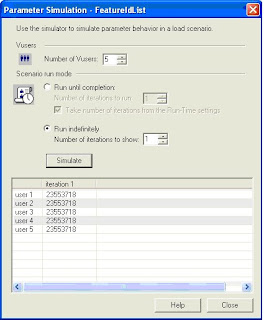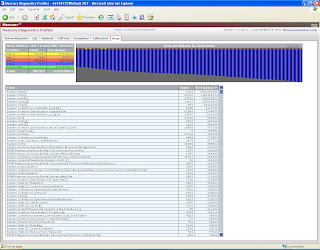Recently the new version of Loadrunner was released - version 9.0. The last zero really indicates how well this version works at the moment. HP purchased Mercury last year and they have worked rather well on making this product look more HP wise.
There are unfortunately still some major bugs that they need to handle, such as the Analysis tool crashing when you try to open either a analysis file, or analysing the results directly from the Controller.
However there are also some new cool features:
fredag 7 september 2007
fredag 1 juni 2007
Mercury Diagnostics Profiler for .NET
Do you know that your page is performing bad under heavy load? Do you know what methods and SQL querys that are responsible for the excessive system usage?
If not, then you should use HP/Mercurys tool called Diagnostics Profiler.
It was designed to be used together with Diagnostics Server, but they also released a free to use version mode - called the Profiler mode.
In the .NET environment you install a probe on the web server you want monitored and scan your business logic binaries to set up a .points file. This points file is telling the profiler which methods on top of the ordinary ASP.NET stuff it should look for. You can also set up specific .points files for ADO.NET and such.
The profiler is listening on a port span you set up, and it defaults to port 35000. To access the profiler you just go to the site in your browser: http://localhost:35000/profiler and this view shows up:
If not, then you should use HP/Mercurys tool called Diagnostics Profiler.
It was designed to be used together with Diagnostics Server, but they also released a free to use version mode - called the Profiler mode.
In the .NET environment you install a probe on the web server you want monitored and scan your business logic binaries to set up a .points file. This points file is telling the profiler which methods on top of the ordinary ASP.NET stuff it should look for. You can also set up specific .points files for ADO.NET and such.
The profiler is listening on a port span you set up, and it defaults to port 35000. To access the profiler you just go to the site in your browser: http://localhost:35000/profiler and this view shows up:
The profiler can also give you an overview on how the heap is growing over time, how many objects that survives garbage collection and what classes that are most common, and use the most amount of space in your heap.
It is also possible to see the long-running SQL querys or Stored Procedures of your application and to see a call breakdown of the page that is calling these procedures, methods or querys.
fredag 11 maj 2007
Powerful Refactoring Plug In For Visual Studio
Mark Miller writes about a cool free tool for refactoring your ASP.NET code -
Refactor! for ASP.NET from Devexpress.
It allows you to do a lot of tasks with just a few mouse clicks such as:
Add Validator
Adds a validator to an input control just by right clicking it and selecting the apropriate validator in the menu.

Surround with UpdatePanel
Surrounds a block of content with the UpdatePanel control.

Refactor! for ASP.NET from Devexpress.
It allows you to do a lot of tasks with just a few mouse clicks such as:
Add Validator
Adds a validator to an input control just by right clicking it and selecting the apropriate validator in the menu.

Surround with UpdatePanel
Surrounds a block of content with the UpdatePanel control.

tisdag 8 maj 2007
onsdag 2 maj 2007
MembershipProvider for MySql in .NET 2.0
In version 2.0 of the .NET framework there is built in support for role based membership. The users are stored in either a database or another data provider such as XML files. Everything is accessed trough a MembershipProvider.
The default MembershipProvider in .NET only works with SQL Server or SQL Express, but you can override the classes and methods to support your own data provider.
I have written an article (in swedish) on the Pellesoft web site about this, and also how you can extend the MembershipUser class to implement your own properties such as first and last name.
The article:
http://www.pellesoft.se/area/articles/article.aspx?artid=975
The original classes comes from www.sprinj.com where you can find the basic solution in english.
The default MembershipProvider in .NET only works with SQL Server or SQL Express, but you can override the classes and methods to support your own data provider.
I have written an article (in swedish) on the Pellesoft web site about this, and also how you can extend the MembershipUser class to implement your own properties such as first and last name.
The article:
http://www.pellesoft.se/area/articles/article.aspx?artid=975
The original classes comes from www.sprinj.com where you can find the basic solution in english.
fredag 27 april 2007
Wiki about Performance
There is a very good wiki about performance testing Web Applications built with ASP.NET:
http://www.codeplex.com/PerfTesting
Everyone who is working with architecture for an application today must be aware of how to design for performance. This is not the case in many projects though.
Developers today tends to do it easy for themselves, but not always in a performance perspective; chatty communication with the Database, large serialized objects sent over the network etc.
In this Wiki you can get an idea on how to calculate and plan for performance in your applications.
Read it!
http://www.codeplex.com/PerfTesting
Everyone who is working with architecture for an application today must be aware of how to design for performance. This is not the case in many projects though.
Developers today tends to do it easy for themselves, but not always in a performance perspective; chatty communication with the Database, large serialized objects sent over the network etc.
In this Wiki you can get an idea on how to calculate and plan for performance in your applications.
Read it!
First post
This is the first publishing here on my blog. Hopefully I will have some time to write here at least every week or so.
This weekend I'm going to Norway for some ski hiking so there won't be any posts until next week.
See you!
This weekend I'm going to Norway for some ski hiking so there won't be any posts until next week.
See you!
Prenumerera på:
Inlägg (Atom)







